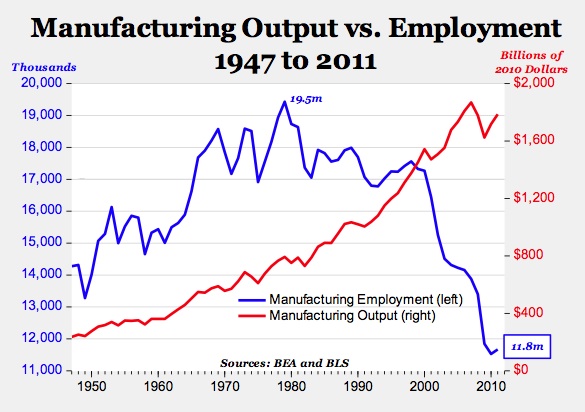I desagree in this topic. Local debt can be controlled (at least in the mid term) . There is no control over foreign debt . While it is relatively easy to devaluate a currency it is hard to revalue it. Further more there is no control over interest ratesLastly, debt is a problem the individual. Debt is just as bad, if we buy locally, than if we buy international. If we didn't buy foriegn goods, then we would be in MORE debt, because the cost of goods would be higher. How is that a win?
That single chart looks ok except for the last 10 years ( 2000 -2010 )FYI..... the first total Free-Trade Agreement the US signed, was implemented in1985-1986.
It doesn't look to me like we have ever had a hard time competing internationally with 1st world, or 3rd world countries.
These two charts tell a different story.


While it is true the us had a manufacturing record on 2013, it seems 2008 was the last year in which the US was the country with the largest manufacturing output.
The jobs that were lost will probably will not be recovered they have either been outsourced or taken by automation. It makes me wonder what kind of future will await for people who lack the skills to get a job in other areas ... I had great expectations from the STEM areas, but recently I've read articles stating that STEM is not undersupplied.
I am not really sure this kind of lack of demand ( for jobs) is something the market will be able to adjust by itself.
IMHO the three pilars of development are science , technology and industry. The US no longer has the upper hand in one of them.
Actually no, both charts do not tell a different story at all.
2013 was a record year in manufacturing. Which means that we haven't lost all the manufacturing capacity that you claimed several posts ago.
Our manufacturing output today, is higher than it has ever been in the history of this country. Period. It's not up for debate, it's a provable fact.
Countries with more people SHOULD have more manufacturing output than our own country. Think about it... if the per-capita GDP of China reached even HALF of our GDP per-capita in the US, the Chinese economy would be $34 Trillion dollars.
So manufacturing would be millions of times larger than US manufacturing, even though they would be half of our GDP per capita.
More people, means more production. That should be really obvious, and yet we act like the US falling to second place, is somehow shocking. Why would that be shocking? We have 310 Million people. They have 1.3 Billion people. Their people could produce 1/4th of the production we do per person, and still surpass us.
India should also easily surpass the US in GDP and manufacturing goods, in the mid-Future.
This should be logical, and expected. Why anyone would think otherwise, is rather baffling
As for the loss of manufacturing jobs....
This also should be completely expected. When you drive up the cost of labor, with OSHA and Unions, and Minimum wage, and Health insurance mandates, and on and on and on......
As the cost of labor goes up, the value of replacing that high cost labor with automation, or lower cost alternatives, goes up too.
Hence, Kiosks replacing Cashiers at McDonalds. $15/hr minimum wage = laid off and replaced with computer.
Same is true of manufacturing jobs.
Like I said before, my company would not exist if you eliminated outsourcing. Those jobs wouldn't come back..... they would simply not exist at all... not here, or there.
We know this for a fact. Our company makes custom products. There simply are not any other companies that do the custom built products that we do.
But there are mass produced, off-the-shelf generic alternative. Non-custom products that could be used instead of ours.
So if we could not outsource some of our parts from China and other countries, and the price of our product went sky high.... our customers would stop buying. They would use generic off-the-shelf mass produced alternatives, and our company would close shop and cease to exist.
Those mass produced products.... they are not hiring manual labor. They are automated.
So whether you allow outsourcing, or prohibit it, doesn't matter. Those jobs, just like you said, are not coming back.
The only way they would come back, is if you cut the minimum wage, cut the regulation, cut the health care mandates, and get rid of Unions, and allow employers and employees to determine their wages on their own.
Then you could see a return of some manufacturing jobs. How many is debatable.
